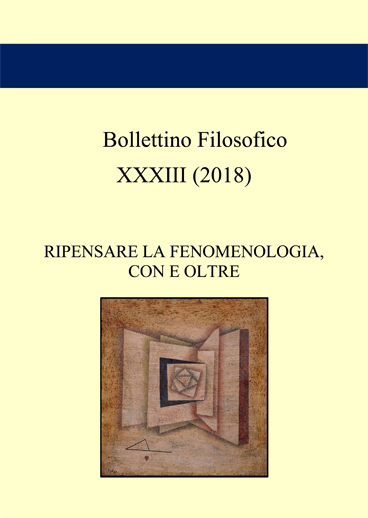Elementi per una nuova fenomenologia dell’a priori culturale
Abstract
At the heart of the phenomenological method lies the move of epochè, whose residual should be caught by a phenomenologizing consciousness quite different from the natural consciousness involved in the intentional constitution of the world. However, this phenomenological residual is part and parcel of an intentional act performed by the phenomenologist as well. Thus, the filling of the eidetic structures unveiled by the epochè should correspond to a peculiar noema of this “catching intentionality”. The paper suggests to suspend the hidden belief in the absolute evidence of the residual of the epochè and to take on the issue of its cultural definition. This choice doesn’t mean to leave the phenomenological way, rather it requires to sharpen the analytical tools of phenomenology through a more radical performance of epochè (E. Fink, M. Henry, M. Richir), and to reintroduce the research about the still neglected cultural a priori (A. Gurwitsch, D. A. Conci, A. Steinbock) across phenomenological anthropology (M. Merleau-Ponty, A. Schütz, L. Embree).Downloads
Bollettino Filosofico pubblica in internet, ad accesso aperto, con licenza:
|
|
CCPL Creative Commons Attribution |
L'autore conserva il copyright sul suo contributo, consentendo tuttavia a chiunque "di riprodurre, distribuire, comunicare al pubblico, esporre in pubblico, rappresentare, eseguire e recitare l'opera", purché siano correttamente citati l'autore e il titolo della rivista. L’autore, al momento della proposta di pubblicazione, è inoltre tenuto a dichiarare che il contenuto e l’organizzazione dell’opera è originale e non compromette in alcun modo i diritti di terzi, né gli obblighi connessi alla salvaguardia di diritti morali ed economici di altri autori o di altri aventi diritto, sia per testi, immagini, foto, tabelle, sia per altre parti di cui il contributo può essere composto. L’autore dichiara altresì di essere a conoscenza delle sanzioni previste dal codice penale e dalle leggi speciali per l’ipotesi di falsità in atti ed uso di atti falsi, e che pertanto Bollettino Filosofico è esente da qualsiasi responsabilità di qualsivoglia natura, civile, amministrativa o penale, e sarà dall'autore tenuta indenne da qualsiasi richiesta o rivendicazione da parte di terzi.
